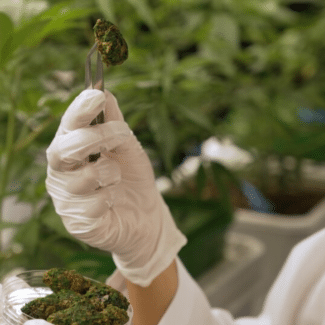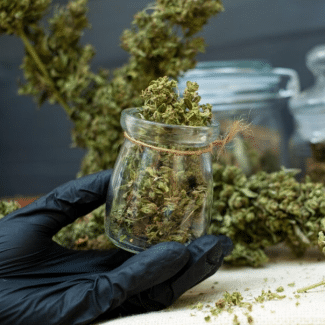Delaware became the 22nd state to legalize cannabis on 23 April 2023. The diamond state is a new member of the states that have legalized cannabis and still has a long way to go.
The market is still untapped and shall remain so until recreational cannabis sales start. This allows entrepreneurs and interested cannabis business owners to be first movers and capture the market share while they still can.
Estimates suggest it will take around two years until consumers can buy weed from licensed dispensaries, which gives you ample time to plan out and get familiar with the requirements of running a dispensary in Delaware.
Delaware might have a small population, but the prospects of the cannabis business succeeding are high. The thriving market for medical marijuana with more than 16,000 registered users shows that recreational users are bound to be more than that.
With the deadline for cannabis licenses being November 2024, it is prime time to step up and be a part of the future cannabis industry in Delaware.
However, before opening a dispensary, you must get familiar with the process. This is where we come in. This article will detail all the information you need on the state’s laws, regulations, and industry framework.
Overview and History of Cannabis in Delaware
Being a southern state, Delaware faced a lot of hurdles before finally becoming a green state. Medical cannabis became legal in 2011, making Delaware the 16th state in the US to legalize medical cannabis.
However, the sales rolled out five years later in 2015. Initially, the state only had one dispensary, forcing people to make long trips to get medical cannabis. As of today, there are multiple medical cannabis dispensaries located within Delaware.
Small amounts of cannabis were decriminalized in Delaware in 2015. Possession of up to one ounce for personal use was considered a civil violation rather than a criminal offense. However, possession of larger amounts, distribution, and cultivation was still illegal.
Licensing and regulation of industrial hemp is done per the 2018 Farm Bill. CBD products with less than 0.3% THC are widely available in Delaware.
With the big milestone of legalization in April 2023, the people of Delaware can now finally buy and sell recreational cannabis legally. The Delaware marijuana control act is in place to regulate and tax future recreational marijuana businesses.
A 15% tax will be deducted on retail sales, which is only limited to recreational cannabis and not medical cannabis.
Current State of the Cannabis Market in Delaware
While the performance of Delaware’s recreational cannabis market is yet to be seen, the prospects are looking quite positive. Delaware state auditor Kathy McGuiness suggests that a cannabis industry in Delaware will result in millions of dollars in tax revenue.
This fact is further cemented by the numbers presented in these findings. State auditors have discovered that the cannabis industry could create $43 million in tax revenue. This industry will also create more than 1000 jobs and grow into a $215 million industry.
These numbers prove that applying for a cannabis dispensary is a big win, as the potential for growth and profit is immense.
Social Equity Programs for Cannabis in Delaware
Social equity programs are designed to empower certain minorities by correcting their historical and current exclusion. Throughout the US, different states have different social equity program requirements and benefits.
Delaware is no exception, and the government offers a social equity license for businesses qualifying for the program. This program will offer discounted application fees and other special provisions for people from impacted areas and communities.
One-third of the cultivation and manufacturing licenses, one-half of the retail licenses, and two of the five testing licenses are reserved for social equity applicants. In addition, social equity applicants will have to pay a discounted application fee and a 40% discounted license fee.
People in disproportionately impacted areas or those convicted of marijuana-related offenses are eligible for this program.
Types of Dispensary Licenses in Delaware
Delaware is expected to start accepting license applications in May 2024. The state of Delaware offers different types of licenses for various businesses which will operate in the cannabis industry.
Retail marijuana dispensaries will be limited to 15 open and 15 social equity licenses. The application will require documentation and other information such as the business plan, safety and security plans, operations and training plans, and other plans.
For a retail dispensary, there will be two types of fees you will need to pay:
- Application Fees (Non-refundable)
- License Fees (For provisional and final license)
|
Application Fee (non-refundable) |
|
| Social Equity Applicants | $1000 |
| Standard Applicants | $5000 |
|
License Fee |
|
| Social Equity Applicants | $6000 biennially |
| Standard Applicants | $10000 biennially |
Other License Types for Cannabis in Delaware
In addition to retail licenses, other licenses will also be offered. Three types of businesses will be covered under these licenses.
License for Cannabis Products Manufacturers
Cannabis product manufacturers include businesses operating to produce different types of cannabis products. The fees are the same as the retail license fees.
|
Application Fee (non-refundable) |
|
| Social Equity Applicants | $1000 |
| Standard Applicants | $5000 |
|
License Fee |
|
| Social Equity Applicants | $6000 biennially |
| Standard Applicants | $10000 biennially |
License for Cannabis Laboratories
Cannabis laboratories are businesses that perform tests to ensure the safety, quality, and compliance of cannabis products. The fee structure is the same as the retail license fees.
|
Application Fee (non-refundable) |
|
| Social Equity Applicants | $1000 |
| Standard Applicants | $5000 |
|
License Fee |
|
| Social Equity Applicants | $6000 biennially |
| Standard Applicants | $10000 biennially |
License for Cannabis Cultivator
Cannabis cultivators are businesses that will grow and cultivate cannabis plants. The license fees are subject to variation and depend on the area used for cultivation.
|
Application Fee (non-refundable) |
|
| Social Equity Applicants | $1000 |
| Standard Applicants | $5000 |
|
License Fee |
|
| Social Equity Applicants | $1500-$6000 biennially |
| Standard Applicants | $2500-$10000 biennially |
Understanding the Cannabis Market in Delaware
Medical cannabis dispensaries currently occupy the cannabis market in Delaware. This will soon change as applications for adult-use marijuana will open in late 2024, followed by approval and opening of new cannabis dispensaries.
The licensing process will be tough and heavily regulated by Delaware, so it is important to prepare beforehand. Plus, businesses that qualify for a license will have the advantage of capturing a larger market share before the state decides to expand its licenses.
Application Process for a Dispensary License
The state of Delaware will delegate a marijuana commissioner, who will be a part of the Division of Alcohol and Tobacco Enforcement, to license, regulate, and inspect cannabis businesses operating in the state.
- You must be over 21 to be eligible for the license application.
- You will also need to be a resident of Delaware for at least three years.
- People with at least $250,000 in liquid assets and no felony convictions (exceptions for social equity programs) will be eligible to apply.
You will also need to make sure you do the following steps to be eligible:
- A well-defined business plan with an annual budget and pro forma financial statements.
- Having detailed safety plans.
- A sustainability plan.
- Plans for business operations, employee training, and staffing.
- An attestation signed by a bona fide labor organization to confirm a labor peace agreement.
- Having a business location at least 1000 feet away from schools, churches, and other public facilities.
Expert Tip: License consultants ensure that every requirement is fulfilled to increase your chances of getting a license.
Steps Involved in Obtaining a License
Once you have met the requirements above, you will have to follow these steps to acquire a cannabis license:
- Register with the Division of Public Health. You must pay the application fee of $5000 to do this.
- You will need to make sure no corners are cut, preferably with the help of a cannabis license consultant.
- Wait for approval. The marijuana commissioner might need more documents or relevant information in the meantime. Meeting these requirements is necessary for approval.
- You will also need to obtain business and other relevant licenses. Once approved, you will be given the final license and allowed to operate your cannabis business.
Required Documentation for a License
To operate a cannabis business in Delaware, you will need multiple licenses and documentation in addition to a cannabis license.
- Information about the location of your business and its structure, interior layouts, building lease information, and contract of sale.
- A detailed business plan, complete with all the financial and budget requirements.
- Other plans include training, safety and security, staffing, sustainability, and corporate structure plans.
- You will need multiple licenses, which include a business license, local permit, seller’s permit, and certificate of occupancy.
Timelines for Obtaining a License
Delaware will start accepting license applications at the beginning of May 2024, and the deadline for license issuance is November 2024. Applicants should expect a period of eight months before they obtain their license.
Financing and Business Plan for a Dispensary
For any startup, a business plan is an important requirement. The same applies to cannabis businesses, as you need a well-defined business plan to sell cannabis in Delaware. It is also one of the prerequisites of the application process.
This plan should include your annual budget, financial plan, marketing strategy, market analysis, operation strategy, and competitive advantage.
Types of Financing Available
Since cannabis is still illegal on a federal level, banks often hesitate or reject financing and loan applications from marijuana-related firms. This results in a big obstacle for aspiring entrepreneurs.
Fortunately, there are other ways to finance your cannabis business. You can get financing using private equity firms, angel investors, and crowdfunding.
Due to banks’ hesitance, many cannabis-specific lenders have entered the market. These specialized lenders provide financing tailored to your requirements.
Plus, they are familiar with the regulatory challenges associated with financing a cannabis business and how to overcome them.
You can also self-fund your business by using your personal savings. This procedure requires minimal external funding as you are funding most of your business.
Importance of a Solid Business Plan
A solid and detailed business plan will help in making your application for a cannabis license stronger. There are multiple factors you can take into consideration developing a solid business plan:
- Executive summary
- Market analysis
- Product or service Offering
- Marketing and sales strategy
- Organizational structure
- Operations and Production
- Financial projections and budget
- Risk assessment and management plan
- Legal and regulatory considerations
- Implementation plan
Risk Management Plan
Even though cannabis is not legal in many states in the US, it is still the fifth most valuable cash crop.
There have been reports of incidents and thefts involving cannabis, so assessing these risks and securing yourself with cannabis insurance is important.
Plus, there are also legal compliance and negative public image considerations, which are threats that a cannabis business must deal with. To identify and minimize risks, the cannabis business can adopt the following suggestions:
- Correctly identifying possible threats and dangers.
- Assessing and prioritizing risks.
- Employing risk mitigation strategies.
- Constant monitoring and evaluation of possible risks.
- Formulating contingency plans for risks that cannot be completely mitigated.
- Compliance and governance.
Market Research and Location for a Dispensary
You can determine proper business positioning and location by an in-depth market analysis before opening a dispensary.
Overview of the Delaware Market for a Dispensary
While the medical cannabis market in Delaware is performing above expectations, it is yet to see how the recreational cannabis market performs. From estimates by Delaware state auditors, the annual revenue and industry worth is in the hundreds of millions of dollars.
Entrepreneurs may assume data and use estimates provided by the state to do a successful market analysis. From the current estimates, it can be concluded that opening a dispensary in Delaware is a worthwhile investment.
Trends and Competition in the Delaware Cannabis Industry
You may expect the competition to be tough, judging from the estimates provided by the state of Delaware.
As of now, a total of thirty retailers will be issued licenses to operate their cannabis business. Fifteen will be social equity applicants, while the rest will be standard applicants.
If the state decides to expand the number of issued licenses, the competition will increase due to new entrants in the market.
The competition for securing a cannabis license will also be tough due to the limited number of licenses offered by the state and the huge number of applicants trying to get their licenses approved.
Location Requirements for a Dispensary
For the dispensary location, the Delaware marijuana control act states that cannabis businesses should be located at least 1000 feet away from certain facilities, which include:
- Primary and secondary schools.
- Churches and other religious buildings.
- Recreational facilities.
- Childcare centers.
- Public spaces like playgrounds and green spaces.
- Public transport stops
- Library systems
Insurance Requirements for a Dispensary
Delaware currently does not have any cannabis insurance requirements. However, business insurance is required according to state laws.
So, we highly recommend getting your cannabis business insured as cannabis faces more risks than other businesses.
Required Policy Types
The state of Delaware has the following insurance requirements:
Coverage Limits
Cannabis insurance can help you out a great deal if your business faces an unfortunate incident. Your insurance provider should cover the liabilities and firm property. Cannabis goods are not covered under insurance plans due to federal illegality.
Note: Insurance providers might not offer plans if you operate from a private residence.
Costs Associated with Insurance
The insurance cost varies and depends on your business circumstances and the goods you sell. The exact amount of application and licensing fees is yet to be seen, but the costs are expected to be lower as the market will be limited.
The average cost of premiums for cannabis insurance can be $975 to $3300 for general liability insurance, providing coverage of $1 million per occurrence and $2 million per aggregate.
Different cannabis insurance providers charge different prices based on the coverage limits, coverage type, and much more. So comparing and selecting the best fit for your business is the best way to go about this.
Resources for Potential Entrepreneurs in Delaware
- allBusiness
- AEO works
- Bloomberg
- Delaware Center of enterprise development
- Central Delaware Chamber of Commerce
- Choose Central Delaware
Additional Resources and Links for Opening a Dispensary in Delaware
The regulatory framework and laws for cannabis in Delaware are highly regulated and strict, so all updates or changes are important.
Summary
Delaware is a new member of the green states, and it will take a while until the Delaware cannabis market reaches its maximum potential.
Entrepreneurs interested in running a cannabis business should start preparing now with the help of cannabis consultants and information available online.
The market is there for the taking, and the estimated earnings indicate a huge potential in Delaware, so ensure that you make the most of this opportunity.
FAQs
How Much Does It Cost to Open and Run a Dispensary?
The application fee is $5000 for standard applicants and is non-refundable. You will have to pay a license fee of $10,000 every two years. The estimated cost of opening and running a dispensary in Delaware range from $200,000 to $500,000.
What Are the Location Requirements for a Dispensary?
Multiple states, including Delaware, require dispensaries to be at least 1000 feet from schools, churches, and other facilities.
What Types of Insurance Policies Are Required for a Dispensary?
The state of Delaware requires businesses to have two insurance policies. These are workers’ compensation insurance and commercial auto insurance.
How Long Does It Take To Obtain a Dispensary License?
The state will start accepting applications in May 2024. The deadline for issuance of licenses is November 2024. It will take approximately eight months for applicants to obtain their dispensary license.
What Are the Regulations for Advertising a Dispensary?
Online advertising and marketing are permitted but are subject to certain limitations provided in 16.Del.C Ch. 49A. Advertising and marketing using print media and broadcast are prohibited.
Can I Have More Than One Dispensary Location?
No, Delaware does not permit more than one dispensary location. A dispensary retail license is only valid for one dispensary location.






